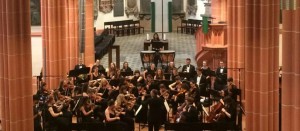
Bronwen Maggs writes from the tour bus on the way back from a successful first German concert…
CUSO tour, Day 3, Heidelberg
“Cardiff University Symphony Orchestra are sleepily on their way back to their second hostel and, in St Peterskirche, Heidelberg, have just performed to their first German audience. Another long and complicated coach journey aside, it has been a beautiful day.
“Our second hostel is in a lovely location, further up the River Rhine. We spent lunchtime out in the sunshine admiring the surroundings and trying our best not to get sun burned. The streets of Heidelberg were picturesque and charming, the locals friendly, restaurants welcoming and St Peterskirche itself made for a wonderful performance venue.
“The concert was a massive success. From an audience perspective it was thought-provoking, astonishing and thoroughly enjoyable to watch. The musicians themselves are in high spirits. There is a resounding sense of accomplishment; Tour Managing Assistant and Principal French Horn, Catherine Mainwaring, says that it was incredible to observe as two days of rehearsals, marketing, organisation and ultimately, hard work, amounted to so much.
“In a way that I have never noted before, the instrumentalists appeared to be involved in the music in every way. Conductor, Mark Eager, commanded the orchestra with confidence and skill. The performance was controlled and yet expressive. So much attention was paid to Mark’s every move by the orchestra, that the ensemble as a whole seemed to move as one. It was wonderful to watch.
“Written twelve years after the death of his children, musicologists believe that Dvořák’s Symphony No. 8 is a reflection on and celebration of his children’s life. It is an accumulation of twelve years of grief. Motifs vary, many are sad and reminiscent and others are triumphant and happy. It was obvious to me that the musicians understood the context. Their involvement in the music made it moving and engaging.
“In general, the dynamics were colourful and in turn, dynamic contrasts always effective. The woodwind and brass came through the texture really well, particularly in Mendelssohn’s Hebrides Overture. At the beginning of the second movement of Dvořák’s Symphony No.8 also, Mark showed an awareness of the effects of the church acoustic and used them to his advantage, pausing after the strings played to allow the sound to resonate and disappear each time before bringing in the woodwind.
“In the performance of Morfydd Owen’s Threnody for the Passing of Branwen, written entirely for strings, the instrumentalists were so engaged in the music, that it was near on impossible for the audience not to be drawn in. The performance of the piece was the highlight of the concert and it will have certainly come across beautifully to an audience who will never have heard it played before. Owen was a student at Cardiff University and this is one of many impressive works which she composed before she sadly passed away, suffering from appendicitis at the age of 26. I know that the orchestra are honoured to bring the work to life for her.
“Considering how far the orchestra have progressed in just these few days, they are all incredibly excited to perform again later this week. Before that though, the musicians are looking forward to meeting Professor Kenneth Hamilton in Wiesbaden tomorrow for a day of tourist activities.
“Watch this space to hear what we all get up to. For now, I think we can all agree there is nothing we want more than to get some sleep.”

